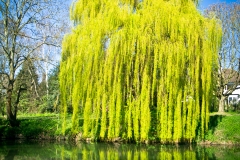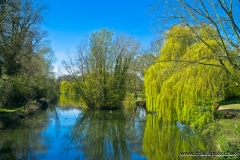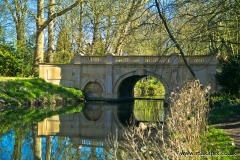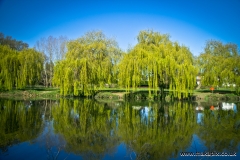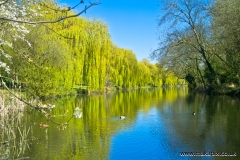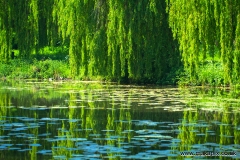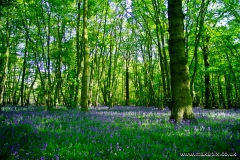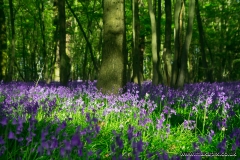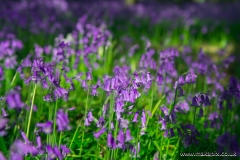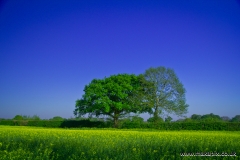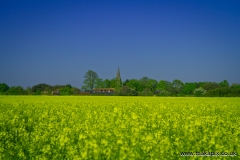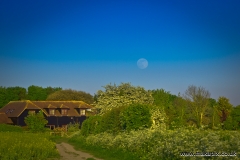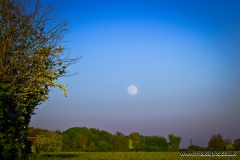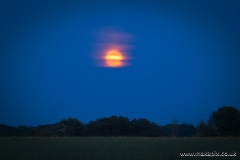Parklands Open Space, Upminster was originally part of Gaynes Manor. 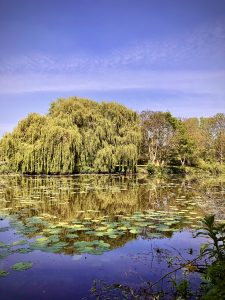 The origin of the Gaynes Estate dates back to Roman Britain and in its hey-day in the Middle Ages, comprised about 1500 acres covering most of the south half of Upminster. In 1962, an Iron Age farm was found on part of the Estate and in the mid-nineties it was more fully excavated with Bronze Age finds taking its history back to about 200 BC or earlier. In this part of England, untended agricultural land rapidly reverts to woodland and these Bronze Age field boundaries have never been replaced, so this part of the Gaynes Estate must have been under continuous cultivation for about 2200 years.
The origin of the Gaynes Estate dates back to Roman Britain and in its hey-day in the Middle Ages, comprised about 1500 acres covering most of the south half of Upminster. In 1962, an Iron Age farm was found on part of the Estate and in the mid-nineties it was more fully excavated with Bronze Age finds taking its history back to about 200 BC or earlier. In this part of England, untended agricultural land rapidly reverts to woodland and these Bronze Age field boundaries have never been replaced, so this part of the Gaynes Estate must have been under continuous cultivation for about 2200 years.
Cranham Brickfields is a small nature reserve located in the London Borough of 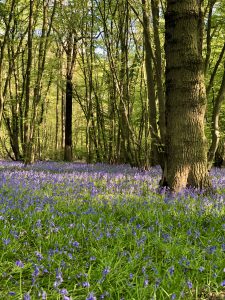 Havering. The reserve has been designated a Grade 1 Site of Borough Importance for Nature Conservation by the Greater London Authority. This is due to the huge varieties of plants and wildlife that can be found at Cranham Brickfields. It is an ideal place to see some beautiful spring flowers including bluebells.
Havering. The reserve has been designated a Grade 1 Site of Borough Importance for Nature Conservation by the Greater London Authority. This is due to the huge varieties of plants and wildlife that can be found at Cranham Brickfields. It is an ideal place to see some beautiful spring flowers including bluebells.
– Essex is home to Britain’s oldest recorded town, Colchester. It was the first Roman capital in Britain.
– Greensted Church is the oldest wooden church in the world. It was built in 1081 AD.
– Great Dunmow is home to the oldest recorded competition in Britain still running today, the Flitch Trials. Mentioned in Chaucer’s Canterbury Tales and believed to have begun in the 13th century, the Trials aimed to find a married couple who had not quarrelled or repented their marriage during the preceding year and a day. A mock court of locals would test the veracity of stories of marital bliss, with a flitch of bacon the prize for success.
– The oldest timber-framed barn in the world is at Cressing Temple near Braintree. The huge Barley Barn was built by the Knights Templar.
– Northey Island is where the battle of Maldon took place in 991, making it the oldest battlefield in Britain.
– The James Stevens No.14 was the second RNLI lifeboat at Walton-on-the-Naze. She has been restored and is now the oldest surviving motor lifeboat in the world.
– The 350 mile long Essex coast is the second longest coastline of any English county.
– The county has 35 islands, more islands than any other English county.
– Southend Pier, at 1.33 miles long, is the longest pleasure pier in the world.
– Saffron Walden is home to the world’s largest turf maze. It’s believed to be over 800 years old.
– Manningtree is Britain’s smallest town…whilst Tiptree is the UK’s largest village
– The largest village green in England is at Great Bentley. It covers an area of roughly 43 acres.
– Colchester Castle is the largest Norman Castle Keep in Europe.
– Built during the reign of Henry VIII, Layer Marney Tower is the tallest Tudor Gatehouse in Britain.
– Danbury Common, near Chelmsford, has the largest population of Adder snakes in Britain.
– In 1920, the first ever radio broadcast featuring Australian Dame Nellie Melba, a famous opera soprano of the time, was made from Chelmsford, the Birthplace of Radio.
– Chelmsford was once the capital of England for a few days when the seat of Government was temporarily moved to the town 600 years ago.
– Iconic Scottish king, Robert the Bruce, might actually have been an Essex boy. Historians have claimed that he was born at Montpelier’s Farm in Writtle, near Chelmsford, in 1274.
– Did you know five US presidents hailed from Essex? George Washington, John Adams, John Quincy Adams, George H. W. Bush and George W. Bush.
– Waltham Abbey is the burial place of King Harold who died in the Battle of Hastings.
– The sailing mecca of Brightlingsea has the distinction of being the only Cinque Port outside Kent and Sussex.
– Essex is one of the few places in the world where the “Little Scarlet” strawberry is grown, the perfect variant for jam making.
– The first crocodile to be brought to the UK was in 1701 by Richard Bradley who kept it in the lake and grounds of his home in Braintree.
– Borley Rectory is widely proclaimed the ‘Most Haunted House in England.

